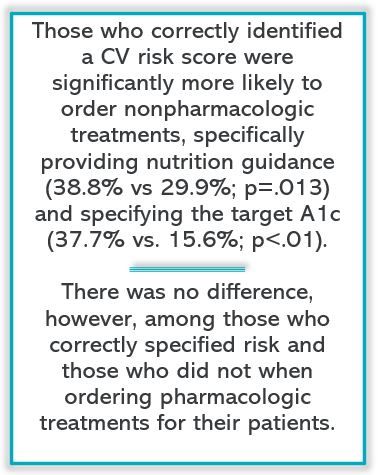- Clinical Technology
- Adult Immunization
- Hepatology
- Pediatric Immunization
- Screening
- Psychiatry
- Allergy
- Women's Health
- Cardiology
- Pediatrics
- Dermatology
- Endocrinology
- Pain Management
- Gastroenterology
- Infectious Disease
- Obesity Medicine
- Rheumatology
- Nephrology
- Neurology
- Pulmonology
PCPs, Cardiologists May Not Adequately Stratify, Treat CV Risk in Patients with Type 2 Diabetes
A new study suggests that while more than 80% of clinicians indicate that they use at least 1 cardiovascular (CV) risk estimation tool when evaluating their patients with type 2 diabetes (T2D), just more than one-third (38.9%) correctly stratified patients’ risk and then used the score to guide treatment.
Complete findings from the cross-sectional patient simulation study, conducted among US primary care physicians (PCPs) and cardiologists, are being presented this week at the 17th Annual Cardiometabolic Health Congress in Boston, MA.
CVD is common among patients with T2D, and clinical practice guidelines recommend stratification of CV risk in this vulnerable population to guide both prevention and treatment, the investigators write. Despite the evidence-based benefits of risk stratification, however, clinicians may not use the estimating tools routinely in practice and those who do may not calculate an individual patient’s risk properly.
Despite the evidence-based benefits of risk stratification, however, clinicians may not use the estimating tools routinely in practice and those who do may not calculate an individual patient’s risk properly.
The present study, the QURE CVD Evaluation of Risk in Diabetes Mellitus (QuiCER DM) Study, led by John Peabody, MD, PhD, professor of epidemiology and biostatistics at the University of California San Francisco, was designed to understand more clearly whether PCPs, who treat the majority of persons with T2D in the US, and cardiologists incorporate CVD risk stratification during assessment of their T2D patients and, if so, whether their calculations are accurate and whether clinicians respond with appropriate clinical guidance.
The QuiCER DM Study
QuiCER DM Study investigators sequentially invited potential participants from a nationally representative roster of 12 500 PCPs and cardiologists. Final enrollment included 160 PCPs and 80 cardiologists who were screened for eligibility between March and June 2022. Mean age among participants was ~58 years and 76.4% were men. The majority of clinicians worked in a suburban/urban setting (87.6%) and were in private practice (79.5%). At the beginning of the study, 81.3% of the cohort indicated that they used at least 1 CV risk calculator in every practice.
Participants were asked to “care for” 3 standardized simulated patients with T2D, each presenting with a common clinical picture: ≥3 CV risk factors, 2 CV risk factors, or chronic kidney disease (CKD).
Of primary interest to Peabody and colleagues were:
1. The frequency and accuracy of the 2 physician groups to correctly stratify the CV risk of T2D patients and
2. What interventions were provided to target modifiable CV risk factors to attain appropriate evidence-based goals.
FINDINGS
Quality-of-care (QOC) scores suggested that participants performed only half of items considered necessary for appropriate management of the T2D patients, with scores averaging 49.4% and ranging between 13% and 84%.
Looking at the 3 patient presentations by T2D complication, QOC performance was best for patients with CKD (51.3%), followed by patients with 2 CV risk factors (49.1%), and then those with ≥3 CV risk factors (47.7%).
The research team found that the +3.6% QOC difference between the CKD patients and the patients with ≥3 CV risk factors was both clinically and statistically significant (p=0.007).
Quality-of-care (QOC) scores suggested that participants performed only half of items considered necessary for appropriate management of the T2D patients, with scores averaging 49.4% and ranging between 13% and 84%.
The researchers also found that while 81.3% of participants had reported at baseline using at least 1 CV risk estimator in clinical care of patients with T2D, across the simulations, they did not assess CV risk in 18.3% of cases and risk was incorrectly stratified in another 42.8% of cases or 61.1% overall. Moreover, just 38.9% of PCPs and cardiologists accurately stratified CV risk for the patients.

When they analyzed severity calculation by case type, Peabody and team found significant differences (p<0.001):
- In patients with 2 CV risk factors, CV risk score was either not calculated or incorrectly calculated 70.5% of the time and calculated correctly by only 29.5% of participants.
- For patients with ≥3 CV risk factors, physicians either did not calculate or incorrectly calculated the CV risk 60.2% of the time, with only 39.8% assigning a correct CV risk.
- In the CKD cases, 52.7% did not calculate or incorrectly calculated CV risk, while 47.3% correctly did so.
The study, the authors write, “confirmed a wide range of variability in how physicians evaluate, calculate, and manage CV risk factors in patients with T2DM.” Commenting on the finding that nearly all participants claimed to use a CV risk estimator regularly but just slightly more than one-third of the cohort correctly calculated a score, Peabody et al write that “this may be due to the numerous CV risk calculators available and by extension a lack of trust in the information from so many risk calculation methods.”
“Moreover, current risk tools do not provide patient specific, dynamic measure of patients’ responses to pharmacologic interventions or to healthier behaviors indicating there is an opportunity for a better method. This apparent gap indicates an opportunity to improve the quality of care in patients with T2DM,” they conclude.
Reference: De Belen E, Ganesan D, Paculdo D, et al. Clinical variations in the treatment of type 2 diabetes patients: a cross-sectional patient simulation study among primary care physicians and cardiologists. Abstract presented at the 17 Annual Cardiometabolic Health Congress; October 19-22, 2022; Boston, MA.
